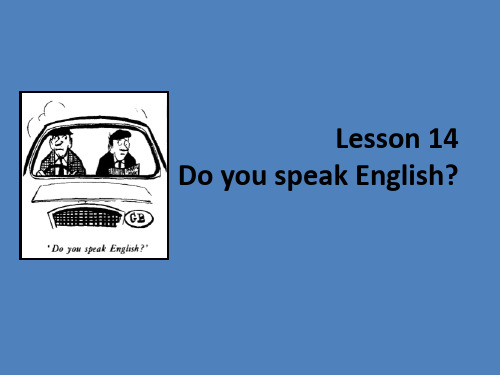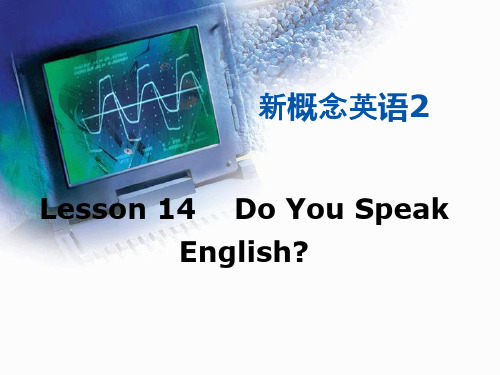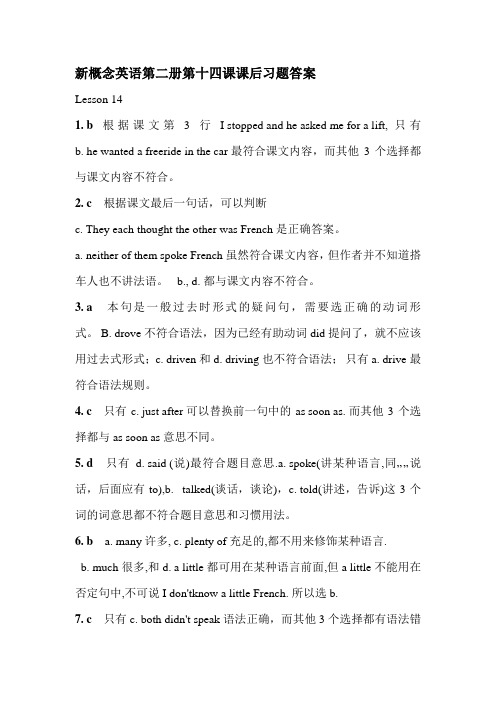新概念英语第二册Lesson 14【Mike最最经典绝对绝密,内部经典精品核心资料】
新概念第二册第14课讲义超详细

Lesson 14 Do you speak English?【New words and expressions】生词和短语amusing adj. 好笑的,有趣的experience n. 经历wavev. 招手liftn. 搭便车reply v. 回答language n. 语言journey n. 旅行★amusing adj. 好笑的, 有趣的The story is amusing. (好笑的)amused adj. 感到好笑的(要笑出声)I am amused.amuse v. 使发笑,使愉快The story amused me.funny adj. 好笑的(不一定要笑出声可以指贬义),开心的,令人开心的interesting / funny story★experience n. 经历(可数);经验(不可数)①n. 经历(可数)He has a lot of experiences.②n. 经验,体验(不可数)They want someone with a lot of experience for this job.Does she have any experience in teaching?③vt. 经验,体验Have you ever experienced anything like this?The village has experienced great changes since 1980.experienced adj. 有经验的,经验丰富的He is an experienced doctor.★wave v. 招手vt. & vi. (使)波动,(使)起伏,(使)飘扬n.波浪,波纹,波①v. 招手vt. & vi. (使)波动,(使)起伏,(使)飘扬Bill waved his hand to us and then drove away.比尔向我们挥手告别后开车走了。
新概念英语第二册第十四课课后习题答案

新观点英语第二册第十四课课后习题答案Lesson 141. b 根据课文第 3 行 I stopped and he asked me for a lift, 只有 b. he wanted a freeride in the car最切合课文内容,而其余 3 个选择都与课文内容不切合。
2.c 依据课文最后一句话,能够判断c. They each thought the other was French是正确答案。
a. neither of them spoke French固然切合课文内容,但作者其实不知道乘车人也不讲法语。
b., d. 都与课文内容不切合。
3.a 本句是一般过去时形式的疑问句,需要选正确的动词形式。
B. drove 不切合语法,由于已经有助动词 did 发问了,就不该当用过去式形式; c. driven 和 d. driving 也不切合语法;只有 a. drive 最切合语法例则。
4. c只有c. just after能够替代前一句中的as soon as.而其余 3 个选择都与 as soon as意思不一样。
5.d 只有 d. said (说 )最切合题目意思 .a. spoke(讲某种语言 ,同,, 说话,后边应有 to),b. talked(讲话,讨论 ),c. told(叙述,告诉 )这 3 个词的词意思都不切合题目意思和习习用法。
6. b a. many 很多 , c. plenty of 充分的 ,都不用来修饰某种语言 .b. much 好多 ,和 d. a little 都可用在某种语言前方,但 a little 不可以用在否认句中 ,不行说 I don'tknow a little French. 因此选 b.7. c只有c. both didn't speak语法正确,而其余3 个选择都有语法错优选误,因此我们只好选 c.8.b 前一句中的短语 on the way 是“在路上”的意思,只有b.during the writer’sjourney(在作者旅途中 )同这个短语意思最靠近,而此外 3 个选择都与它的意思不一样。
新概念英语第二册Lesson 14(95张)

Text
•He gets up early everyday except Sundayvery good except for his hand writing.
Text apart from
•Apart from other considerations, time is also a factor. •(=besides)
Text
Japan is to the east of China.
Text
• in 在范围之内 • on 接壤 • to 不相接
Text
Text
•After I had left a small village in the south of France, I drove on to the next town.
•as soon as 一…就…
Text
• As soon as hehad got turned on the computer.
home, he
Text
•As soon as he had got into the car, I said good morning to him in French and he replied in the same language.
Grammar
•We returned to our hotel.
Grammar
As soon as the sun had set we returned to our hotel.
Grammar
•He finished lunch.
Grammar
•He asked for a glass of water.
New words and expressions
新概念英语第二册lesson14

New Words and Expressions
reply
① vi. 回答,回复 他生气地回答,“不行。” He replied angrily, “No way!” 回信 reply to the letter answer the letter reply 和 answer 的异同 意思基本一样,都可以作名词 搭配不同,reply to sth, answer sth. ②n. 回答,回复 请您尽快回答。(immediate) I request an immediate reply. An immediate reply is requested. By Roy Ouyang Oct 28th, 2012
New Words and Expressions
By Roy Ouyang
Oct 28th, 2012
amusing adj. 好笑的,有趣的 这个故事好搞笑! The story is very amusing. amused adj. 感到好笑的 I am / feel amused at the story. amuse v. 使发笑,使愉快 The story amused me. amusing 近义词: Interesting funny
古意大利语派:拉丁语、意大利语、法语、西班 牙语、葡萄牙语等 日尔曼语派的北日尔曼语:挪威语、丹麦语、瑞 典语等;日尔曼语派的西日尔曼语:德语、荷兰 语、英语等 中学学的词汇大都是日尔曼语词汇。例如,以下6 个基本动词,get、give、make、have、take、do ,可以说只要熟练掌握这这几个词的用法便可学 会英语对话的基本动词。这几个词的词源,都是 OE词汇,是450年到1100年之间只用的日尔曼语 词汇。日常会话中反复出现的1000基本词汇中, 六、七成都是日尔曼语词汇。如果牢牢掌握了基 本词汇,英语词汇的学习也就能显著进步。但日 尔曼语在2万英语词汇中仅占十分之一。
新概念英语第二册逐句精讲语言点第14课(3)

新概念英语第二册逐句精讲语言点第14课(3)Lesson 14 Do you speak English?课文内容:I had an amusing experience last year. After I had left a small village in the south of France, I drove on to the next town. On the way, a young man waved to me. I stopped and he asked me for a lift. As soon as he had got into the car, I said good morning to him in French and he replied in the same language. Apart from a few words, I do not know any French at all. Neither of us spoke during the journey. I had nearly reached the town, when the young man suddenly said, very slowly, ‘Do you speak English?' As I soon learnt, he was English himself.精讲笔记:7.Neither of us spoke during the journey.在旅途中,我们两个人都没有说话。
语言点比较学习“...of+范围”结构的短语:1)neither of两者中任何一个都不能够(谓语动词一般用单数)Neither of them has train tickets.他们俩都没有火车票。
2)either of两者中任何一个都能够Either of the brothers will come.这兄弟俩中会来一个。
新概念英语第二册-Lesson-14

After I had left a small village in the south of France, I drove on to the next town.
如果,主句和从句的两个动作都发生在过去:
(1)两个动作同时发生,用过去进行时.
(2)两个动作一前一后,发生在前的动作用过去完成时。
job. Does she have any experience in teaching? ③ vt. 经验,体验 Have you ever experienced anything like this? The village has experienced great changes since
be amused at / by因为感到好笑 be amused to do sth做..取乐
★experience n. 经历(可数);经验(不可数) ① n. 经历(可数) He has a lot of experiences. ② n. 经验,体验(不可数) They want someone with a lot of experience for this
• A: I'm in a big trouble!
• B: Why is that?
• A: I saw a mouse in my house!
• B: Oh, well, all you need to do is use a trap(捕捉器).
• A: I don't have one. • B: Well then, buy one. • A: Can't afford one.
Can you give me a ride to the airport? 回家路上,我请李先生给我搭个便车
新概念第二册lesson_14解读

If you want to put
except in the front of the sentence , use
expect for instead
Expect for Tom , I invite everyone. Now look at this picture
Expect for the math book, I have packed everything. Apart from the math book, I have packed everything.
2. On the way, a young man waved to me. 1) on the way 在途中 on the way to some place 在去某地的途中 on one’s way to some place 在某人去某地的途中 e.g. on the / my way to work
★journey n. 旅行 所有的旅行,偏重于陆地旅 行 go on a journey;3 days' journey(三天路程) trip n. 短距离旅行或出差(时间或距离上较短) go on a trip = go on business travel n. 周游(长途旅行) tour n. 游玩(为了玩) tourist n. 游客 voyage n. 旅行(海上) flight n. 空中飞行
on the way here / there / there
In the way 挡路 He tried to get to the door, but the table was in the way. 他试图走近大门,可是桌子挡住了去路。 By the way 顺便说 By the way, how is your mother? 顺便问一下,你妈妈怎么样?
新概念英语第二册lesson14

• South • South-南 /north-北 /east-东/west-西 • 1) n南部,南 • In the south of 在……南部(范围之内) • This is in the South of Israel. • 这是在以色列的南方。 • On the south of 在……以南(范围之外,接壤,相邻) • Hunan is on the south of HuBei. • 湖南紧邻湖北的南边。 • To the south of ……以南(隔海相望) • Mexico is to the south of the USA. • 墨西哥在美国之南方。 • 2) adj. 南面的 • The south gate of a school • 3) adv. 向南的 • Eg. Those windows face south. • Eg. Those windows face east.
• Trip n (美)包括乘短途交通工具以及徒步远足的所有旅行
•
(英)通常指短途的观光旅行
• A bus trip
• A business trip
• Take a trip
• Voyage 航海,航行,乘船旅行
• Eg. Go on a voyage around the world
• 做环游世界的旅行
• Eg. When I woke up it had already stopped raining.
• Eg. I hadn’t had any food before I came here.
• Eg. She didn’t go to bed until she had finished her work.
新概念英语第二册第十四课课后习题答案

新概念英语第二册第十四课课后习题答案Lesson 141. b 根据课文第3行I stopped and he asked me for a lift, 只有b. he wanted a freeride in the car 最符合课文内容,而其他3个选择都与课文内容不符合。
2. c 根据课文最后一句话,可以判断c. They each thought the other was French 是正确答案。
a. neither of them spoke French 虽然符合课文内容,但作者并不知道搭车人也不讲法语。
b., d. 都与课文内容不符合。
3. a 本句是一般过去时形式的疑问句,需要选正确的动词形式。
B. drove 不符合语法,因为已经有助动词did提问了,就不应该用过去式形式;c. driven 和d. driving 也不符合语法;只有a. drive最符合语法规则。
4. c 只有c. just after 可以替换前一句中的as soon as. 而其他3个选择都与as soon as 意思不同。
5. d只有d. said (说)最符合题目意思.a. spoke(讲某种语言,同……说话,后面应有to),b. talked(谈话,谈论),c. told(讲述,告诉)这3个词的词意思都不符合题目意思和习惯用法。
6. b a. many 许多, c. plenty of 充足的,都不用来修饰某种语言.b. much 很多,和 d. a little 都可用在某种语言前面,但 a little 不能用在否定句中,不可说 I don'tknow a little French. 所以选b.7. c只有c. both didn't speak 语法正确,而其他3个选择都有语法错误,所以我们只能选c.8. b前一句中的短语on the way 是“在路上”的意思,只有b. during the writer’sjourney(在作者旅途中)同这个短语意思最接近,而另外3个选择都与它的意思不同。
新概念第二册Lesson 14知识要点总结

新概念第二册Lesson 14 复习要点一.词汇拓展:1.amusing/amused/amusementI had an amusing experience last year.去年我有过一次好笑的经历。
He told me a story and I was amused.他给我讲了个故事,我觉得很好笑。
To my amusement,he fell on a banana skin.使我觉得好笑的是,他踩到香蕉皮滑倒了。
Surprise/surprised/surprisingShock/shocked/shockingExcitement/excited/exciting2.experience/experiencedShe is an experienced teacher.她是一位有经验的老师。
She has a lot of experience.她很有经验。
She told me about her experiences in South Africa.她跟我谈起了她在南非的经历。
3.wave to..../shake----shook-----shakenShe waved to the driver and the bus stopped.她对司机挥了挥手,公车停下来了。
He didn’t know about it,so he shook his head.他不知道这件事情,所以他摇了摇头。
I like to walk in the waves on the beach.我喜欢走在海边的海浪里。
4.LiftHe lifted the heavy box.他举起了那个沉重的箱子。
He disappeared in the lift.他进了电梯,消失了。
5.reply toYou didn’t reply to my letter.你没有回我的信。
I didn’t receive your reply.我没有收到你的回复。
新概念英语第二册Lesson14 (共25张PPT)

• 类似词语: • excite --exciting --excited • interest ---interesting --- interested • move ---moving ---moved
• a. 副词on紧跟在动词后,表示继续,向前的意思) • 他说个不停
• He talked on and on • 让我们走吧
• L et us go on. • drive to 开车去某地 • b.过去完成时 • He talked on until everybody had gone. • 他滔滔不绝地讲到大家都走了。
Lesson 14 Do you speak English ?
• amusing • experience • wave • lift • reply • language • journey
New words and expressions
• 1. amusing adj. (令人感到)好笑的,有趣的 • The story is amusing. • amused: adj. 感到好笑的 • I am amused. • amuse v. 使发笑,使愉快 • The story amused me.
to him in French and he replied in the same language. ④Apart from a few words, I do not know any French at all.⑤Neither of us spoke during the journey. I had nearly reached the town, when the
- 1、下载文档前请自行甄别文档内容的完整性,平台不提供额外的编辑、内容补充、找答案等附加服务。
- 2、"仅部分预览"的文档,不可在线预览部分如存在完整性等问题,可反馈申请退款(可完整预览的文档不适用该条件!)。
- 3、如文档侵犯您的权益,请联系客服反馈,我们会尽快为您处理(人工客服工作时间:9:00-18:30)。
主讲:Mike有兴趣的可以加我的QQ :290143015我们可以一起交流英语,互相学习,交流好的英语课件,交流好的英语口语!期待你的到来!Being Excellent Is What Never Dies-----MikeMike 更多资料在地址:/?busin ess&aid=6&un=wdeshouji#7欢迎大家下载、交流。
!开始学习吧!Mike 语法经典讲解词法部分完型填空考查内容语篇信息词汇手段语法手段逻辑手段复现同现替代省略顺序关系并列关系分指关系转折关系解释关系因果关系语法项目新概念英语第二册Lesson 14Do you speak English?主讲:MikeToday we’ll listen to a story about an Englishman’s experience in France.KEY WORDS ANDEXPRESSIONSamusinga.好笑的,有趣的experiencen.经历wavev.招手ask sb. for a lift请求搭便车apart from除了…以外journeyn.旅行reachv.到达Questions:What happened when the writer was driving to a town in France?In which language did the young man reply to the writer’s greetings?Why did neither of them speak during the journey?Question 1:What happened when the writer was driving to a town in France?Question 2:In which language did the young man reply to the writer’s greetings?Question 3:Why did neither of them speak during the journey?Answer :A young man waved to the writer and asked for a lift.Answer :He replied in French..Answer :Because both of them thought the other was French and both of themknew very little French.town. On the way, a young man waved to me. I stopped and he asked me for a lift. As soon as he had got into the on the way ,in the way ,in this way ,by the way ,in a wayI waved goodbye to him.. As soon as he had got into the car, I said good morning to him in French and he replied in the same language. Apart from a few words, I do not know give sb. a lift / give sb. a rideCan you give me a ride to the airport?. Apart from a few words, I do not know any French at all. Neither of us spoke during the journey. I I’ll call you as soon as I arrive there.. Neither of us spoke during the journey. I apart from=except forWe had a good time except for the weather.I’m not hungry at all .I had an amusing experience last year. After I had left asuddenly said, very slowly, “Do you speak English?” As I small village in the south of France, I drove on to the nexttown. On the way , a young man waved to me . I stoppedand he asked me for a lift . As soon as he had got into thecar, I said good morning to him in French and he replied inthe same language . Apart from a few words, I do not knowany French at all . Neither of us spoke during the journey. Ihad nearly reached the town, when the young mansuddenly said, very slowly, “Do you speak English?” As Isoon learnt, he was English himself!As we all know, smoking is very harmful.As I have told you, I am very interested in English.I had an amusing experience last year. After I had left asmall village in the south of France, I drove on to the next and he asked me for a lift. As soon as he had got into the car, I said good morning to him in French and he replied in any French at all. Neither of us spoke during the journey. I had nearly reached the town, when the young man I had an amusing experience last year. After I had left a small village in the south of France , I drove on to the nexttown. On the way, a young man waved to me. I stoppedand he asked me for a lift. As soon as he had got into thecar , I said good morning to him in French and he replied inthe same language. Apart from a few words, I do not knowany French at all. Neither of us spoke during the journey. Ihad nearly reached the town , when the young mansuddenly said, very slowly, “Do you speak English?” As Isoon learnt, he was English himself!过去完成时:had+过去分词过去完成时:表示在过去的某个时间点已经完成的动作或事情,通常用来表示发生在过去的两个事件、动作中哪一个发生在前(发生在后的还用一般过去时)。
He finished his work. He went home.After He had finished his work, he went home.The children ran away. They broke the window.The children ran away after they had broken the window.She finished her homework. Her mother entered her room.She had finished her homework when her mother entered her room.The sun set. We returned to our hotel.As soon as the sun had set, we returned to our hotel.I did not understand the problem. He explained it.I had not understood the problem until he explained it.练习题(After) She wrote the letter. She went to the post office. (After) He had dinner. He went to the theatre. (When) I fastened my seat belt. The plane took off. We did not disturb him. (until) He finished work.(As soon as) He left the room. I turned on the radio. He was very ill. (before) He died.Homework:请用after,when,as soon as,until分别造一个含有过去完成时的句子,完成后发送到E-mail:cothy20@,请在文档中注明学生姓名。
1. Whom did the writer give a lift to in the south of France last year?2. Did they greet each other in English or in French?3. Does the writer speak any French or not?4. Did they sit in silence, or did they talk to each other?5. What did the young man say at the end of the journey?6. Was he English himself, or was he French?The writer gave a lift to a young man in the south of France lastyear. They greeted each other in French. The writer doesn’t speakany French. They sat in silence. The young man said, “Do youspeak English?” at the end of the journey. He was English himself.(50 words)难点一:ask,ask forAfter the lesson, he asked me a question.He asked for an apple.难点二:except,except for,apart fromI invited everyone except James’s brother.Except for/Apart from this, everything is in order.难点三:which of,either of,neither of,both of Which of the two do you want?Either of them will do.I like neither of them.(=I don’t like either of them.)I bought both of them.注意:neither本身带有否定含义,不可与not一起用。
